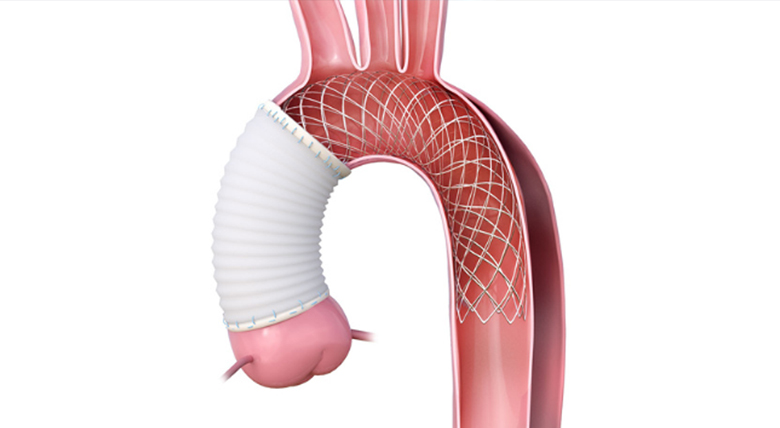Keeping Hearts Beating: Advanced Care for Complex Aortic Disease

When faced with complex presentations of aortic disease, providers can turn to AHN’s Aortic Disease Program at Allegheny General Hospital. The program offers leading-edge treatments for all conditions affecting the aorta, including advanced surgical options for aortic dissection.
Comprehensive care for aortic dissection
Aortic dissection — a tear in the intimal layer of the aorta, most often in the proximal descending thoracic segment — can rapidly progress to life-threatening complications, including internal hemorrhage, pericardial effusion, or ischemia. Without proper intervention, mortality exceeds 50% within the first week.*
Managing aortic dissection remains clinically challenging, especially as the diseased vessel may remain structurally compromised post-repair. AHN’s cardiovascular specialists work collaboratively and use advanced imaging technologies — including echocardiography, 3D CT, and MRI — to guide timely diagnosis and individualized treatment plans that promote long-term heart health for even the most complex cases of aortic disease.
Treatment is also supported by two newly constructed hybrid operating suites equipped with next-generation technologies, enabling surgical teams to exceed national survival benchmarks in aortic dissection care
Leading the region in surgical innovation
Scott Halbreiner, MD, cardiac surgeon at AHN Cardiovascular Institute, was among the first in the U.S. — and the only provider in Pennsylvania — to successfully implant a new metal stent device, manufactured by Artivion™. Clinically proven to treat aortic dissections safely and effectively while significantly improving survival rates, this device offers several key advantages over traditional surgical grafting:
- Atraumatic placement with reduced risk of intimal tearing
- Improved stabilization of the aortic arch and descending segments
- Enhanced remodeling of the dissected aorta
- Rapid restoration of perfusion to distal organs
- Lower incidence of post-surgical complications
“Thanks to the innovation of this new stent, we’re seeing mortality rates drop by over 70%,” said Dr. Halbreiner.** “Patients are recovering with fewer adverse events like stroke, heart attack, and renal failure, leading to a significantly better quality of life.”
How to refer
Patients with uncontrolled hypertension, a history of tobacco use, or a family history of aortic disease could be at a higher risk for dissection. AHN’s Aortic Disease Program is here to support patients at any stage through compassionate care and life-saving interventions. Call 412-442-7650 to speak to an AHN Aortic Coordinator, or visit AHN Center for Aortic Disease to learn more.
Source: Aortic Dissection. ncbi.nlm.nih.gov.
Source: A novel hybrid prosthesis for open repair of acute DeBakey type I dissection with malperfusion: Early results from the PERSEVERE trial. JTCVS.org.
About M. Scott Halbreiner, MD
Dr. Halbreiner is the Director of Research in Cardiac Surgery and has been widely and nationally published in the field, including presentations at national conferences. He serves as the primary investigator (PI) in many international and national clinical trials as well as the PI for the largest multi-institutional collaborative research effort in cardiac surgery – Cardiothoracic Surgical Trials Network (CTSN).
The AHN Aortic Disease Program offers coordinated care from a team specializing in conditions affecting the aorta, including aortic dissection or aneurysm.


